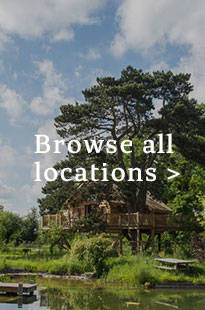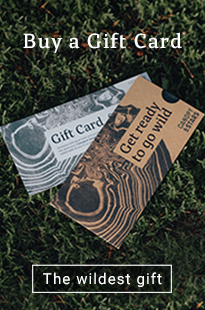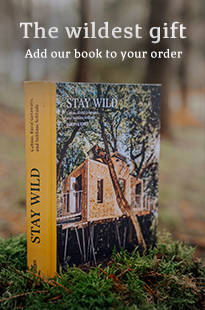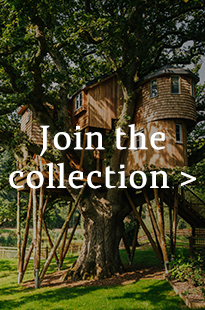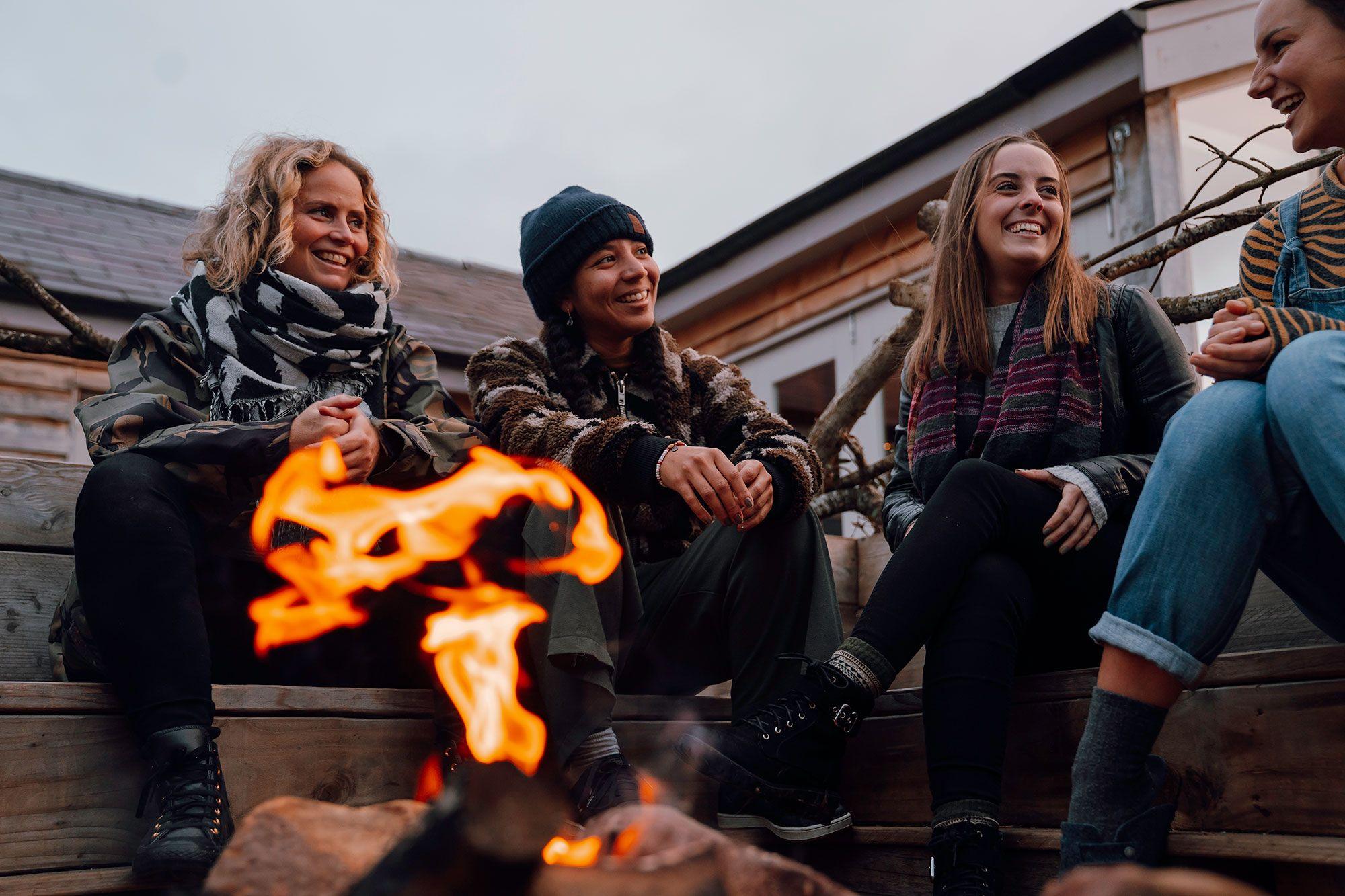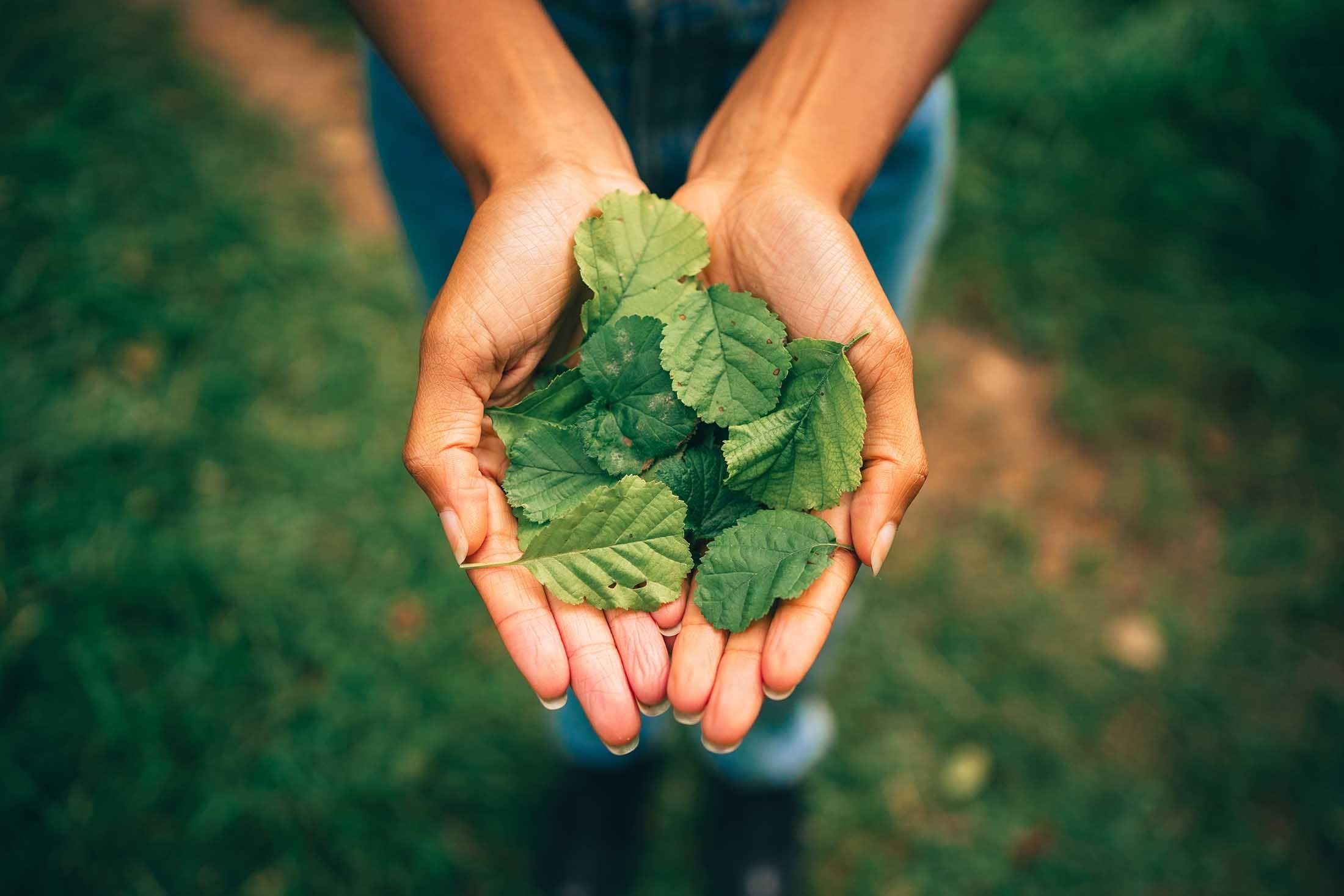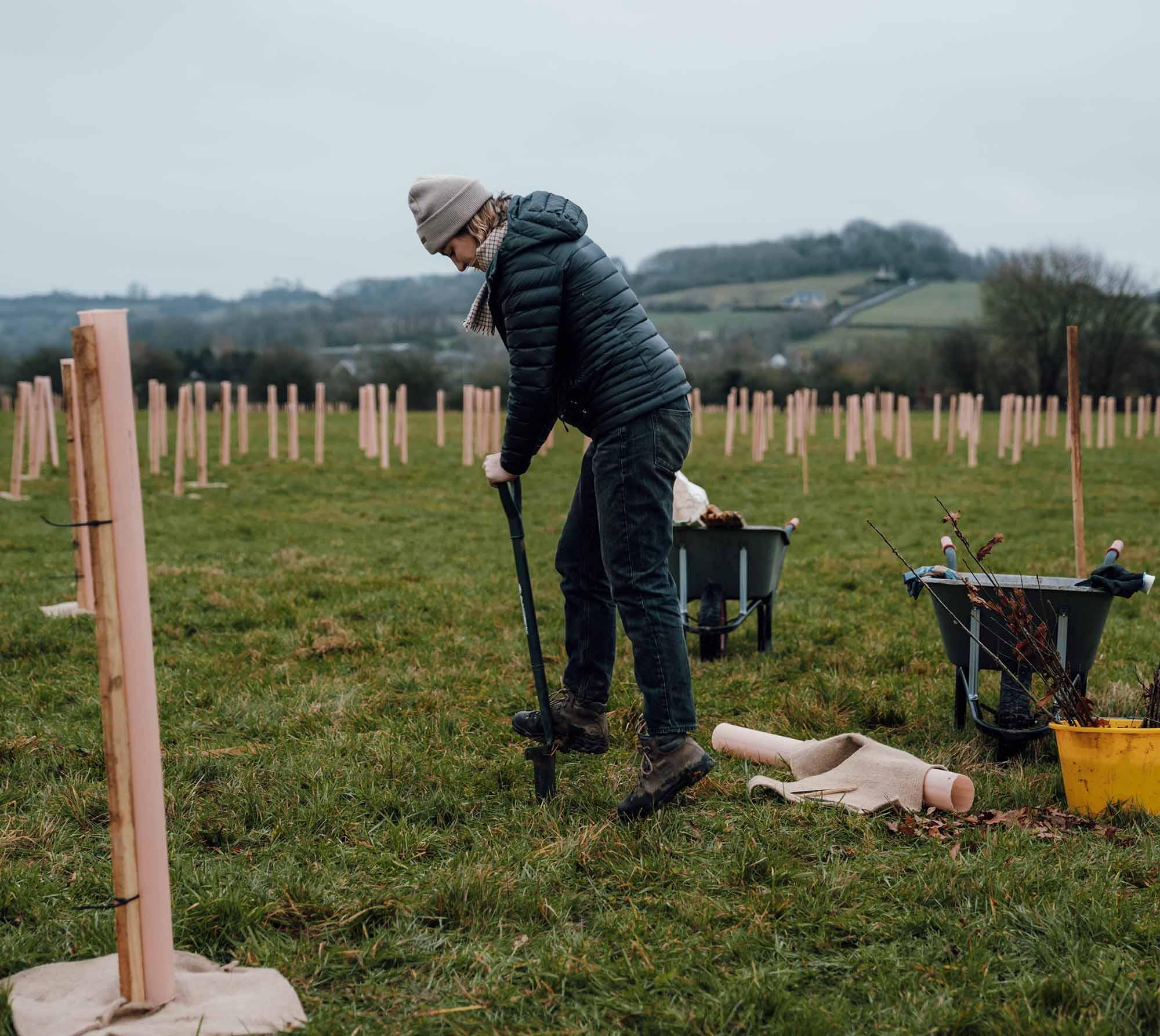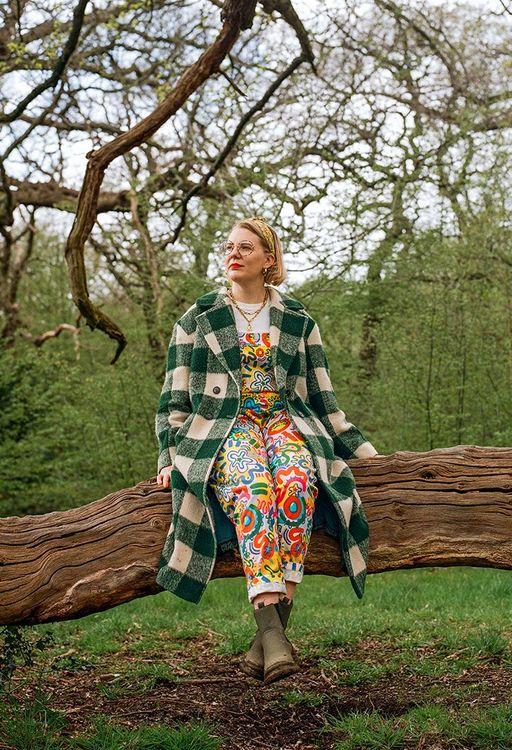
A Life More Wild – Series 4, Episode 4
Emma Gannon
Writer and broadcaster Emma Gannon on the regenerative value of doing nothing
Emma Gannon has an incredible understanding of the pressures society currently places on us. Her books both fiction and non, her podcast and her renowned Substack, have insightfully examined modern living, discussing the difficulties and opportunities of the digital age.
I remember one day just like throwing my phone. Like, under the bed, it was like gathering dust and I was like, I didn't care. Like I was like, honestly, like everything can wait, like my job isn't even that important. So I think I had to remind myself with my own agency, of my own life, basically.
I'm Chris from Canopy & Stars. And this, is A Life More Wild. Join Emma now as she walks through Hackney marshes and discusses the danger of living in a virtual world, mind meals, and what choosing not to have children meant for the shape of a life.
So right now, we are in Hackney Marshes, which is about 30-minute walk from my house. And it's lots of green space, lots of trees, lots of changing greenery, and a bit of my safe space, I think. I come here when I really need to think. And I love it.
So yeah, it's a really big expanse of greenery. There's always people walking their dogs, cycling, with friends, sometimes playing football or playing sport in like the green. And the route that I do is, kind of like a country lane, which I really like in the middle of London, because there's a river, like the River Lea goes all the way through. So there's always ducks and wildlife, and dogs jumping in the river. And whenever I post pictures of it, people are like, ‘Oh, my God, where are you are you? Are you on holiday?’ And I love the fact that I'm in London, because I think London gets a bit of a bad rep. I think London people assume it's really claustrophobic and busy and grimy. But it's really beautiful here.
So as a writer, obviously I spend a lot of time at my desk, and a lot of time typing away, and getting a bad back. So whenever I need, just a bit of exercise, but also thinking time, I come out here because I just don't think sometimes you can crack something really difficult, even in your personal life or in your work, if you're not getting space from it. So, it's about 40 minutes, like the whole route. And I go down the canal as well. So it kind of breaks it up. But um, I always come back with something being solved. And I've just finished writing a novel, my second novel, which took me three years. And I know it sounds a bit ‘woowoo’. But like I need to come out here to kind of figure out what the characters are trying to say to me. And I just can't do that in my little office at home.
There's a bench over there, that I sit on sometimes and it's never really anyone here so, I really like it.
Yeah, I think with nature, I took it for granted when I was growing up. I grew up in Devon, so a lot of amazing, beautiful landscapes and the beach and rolling like the green rolling hills. And I was just so uninterested in it, and I look back now I think that's so ungrateful. But I just wanted to get to Soho. I just wanted to get to the grimy city life and meet people that were interesting and different and get on the tube and everyone looks different. But now, obviously, I still love that about London. But now I really understand why nature is important to our mental health. Loads of science that says that trees and leaves and plants really release chemicals. Release dopamine rushes to the brain. But also, there's something really neutral about nature, like you come here, and they're not judging you. Like the trees aren't saying anything other than just, I'm here. Being myself. If that doesn't sound too weird. So, it's a neutral grounding, I think to just be in reality, like what are the trees doing? Today it's a sunny day, but sometimes it's gray. And you just meet the nature where it's at.
Well, I feel very lucky because I'm an old Millennial, technically, which means I was the first generation to grow up into my adolescence with a smartphone, but I also didn't have a phone for a lot of my childhood. So I'm very different to my Gen Z, nieces and nephews who, like literally came out of the womb and was handed an iPad basically, which is fine. But I had a period of time where I wasn't on any technology. So I think I did enjoy climbing trees and rockpooling getting cuts and bruises on my legs, finding insects, like, I definitely had that childhood. So, I wouldn't say I was glued to my phone at all. So it was when I came into my teens, like later teens, all I wanted to do was sit on the family computer. And I don't think that's any different to now. But I did have to maybe, get in touch with nature again after that period of time where I was quite insular. For sure. Yeah.
Well, I can't speak for everyone. But my experience was that, the internet was this really exciting thing, that no one yet understood the true power of it. Like we were the first generation I think, to have sussed out how to use it, how to make new friends all over the world, how to actually like brand yourself, like with a nice profile picture and have a bio and the very, very early seeds of growing an internet job, essentially, which is what I did. And so, I don't blame anyone for getting sucked into it. Because it is like a candy machine isn't it? It's like a midnight feast of dopamine and connection. But I think that's why I wrote my book Disconnected, which is about how to stay human. You can't live your whole life in a virtual world, you have to be in touch with nature, because that is the rules of our world. And when we lose touch with those cycles, and we lose touch with like our menstrual cycle, or the planetary cycles, or the seasons, we lose touch with who we are. That's when the mental health problems, I think really kick in. So it's really important. I think, that, yeah, enjoy the internet. I've got friends all over the world. I'm meeting up with a friend next month in New York who I met online, but have a life outside of it.
I definitely notice my relationship change with nature with the seasons changing, because I've actually learned to really enjoy every single season. I love winter. I love a cold day. I love the rain. I love just like staying inside and getting cozy and buying really thick blankets and making endless cups of tea and writing and reading. Like I can really romanticize winter. But obviously, you know, we're part of nature. So in the springtime, your leaves start to unfurl, you start to get new ideas again, maybe you start getting ideas that you've never had to before you want to socialize more, you know, it's all it's all part of one big thing, isn't it? So, yeah, I think I'm able to experience and enjoy whatever I'm doing at the time, I think.
So my book, The Success Myth, came out in May 2023. And it's essentially a book that really questions the myths and lies, I suppose that women especially, have been told about success, I think it's for men too. But I really wanted to look into this idea of really playing the game of success in traditional, in the traditional sense of climbing the ladder, or trying to do it all or trying to be this like outwardly successful person in society, and how that doesn't often match up with the reality of how you feel, and how success is so much more nuanced than, just like looking really successful online, basically.
So A Year of Nothing is, it's actually a two book special with The Pound Project, which is a really amazing, independent publisher. And it's split over four seasons, and it's basically a year of what I noticed when I wasn't trying to achieve anything or do anything outwardly successful. Because you know, The Success Myth is basically about how I was kind of addicted to work. And it's just, I hope people like it. It's actually a really soothing book. It's like an anti-, it's like an anti-to-do-List. It’s like, I looked after people's dogs, I watched Disney Channel films, I went swimming, I like basically just went back to being a bit of a big kid again. And so, the book is about the magic in the everyday I suppose.
So in, I think, end of 2022, I got married, I moved into a new house, I launched a new book, I, like everyone, was traumatized from the pandemic, and was just so exhausted and burnt out. And I'd written quite a lot of books. You know, I've been writing books since I was 25. I'm about to turn 35. And it was just this time of just, utter surrender to nature, I guess, telling me to just go underground and chill out for a bit because, you can't blossom the whole year round. I think I just needed a break. And I've been quite open about the fact that I don't want to have children. And I think, for a lot of women, not that it's a break. But when they have kids, they do have a natural career break. Even though they're obviously off doing a difficult job, different one. But because I'm not planning to have kids, it was like, when am I going to stop working for a bit. Like, I feel like I really need that to regenerate my ideas and regenerate myself. So yeah, I took basically the year off. And I've actually got a new book coming out called A Year of Nothing, all about that year. And it's like all the mundane stuff that happened. Because so much happens when you do nothing basically.
So a friend of mine, Anna Martha, she's a psychotherapist, she taught me this, she said that basically, we need three ‘mind meals a day’, she calls it. So how we need breakfast, lunch and dinner, we basically need three periods in the day, where we're doing something, just for us, or just for our minds. So essentially, you know, 20 minutes, sit in the garden, have a cup of tea, 10 minutes, pick up a book, you know, 10 minutes, sit on a yoga mat and just stare into space, like whatever it is, she really encouraged these mini breaks in the day. And that's something I really, really stick by. Because I think the overwhelm comes when we don't have any space to think. And I really believe that well-being is about capacity, it's about factoring in times in the day where you can just breathe. And it does give you that stamina to keep going, I think.
While I used to come out here quite a lot when I was struggling to write my book, because this one was really hard. My first novel Olive, actually came out really easily. I wrote it in Margate actually in a little B&B, not all of it. But like I did a lot of it there. And this one I've been working on for years and years and it just wouldn't really come out. And I really needed the walks. I found that I would come back from a walk feeling encouraged to carry on. And I think it's really important as well to not listen to other people's opinions, too much, when you're writing, because they can put you off, even if they're well meaning. So yeah, I would come back from this walk. Always feeling better. There's no walk I've ever done where I felt worse. And I think that's why going on walks is really important. So yeah, I would take my journal, sit on one of the benches looking over the water. And yeah, just listen, like listen to whatever is coming to you and get the best ideas
So at the moment, we are in a little pathway leading down to the river, and there's loads of flowers and blossoms around, yellow flowers, purple flowers, I can't tell you what they're called but guess was bluebells as well. And there's always runners and people on bikes. Not too many, but just enough to feel safe as well. I think it's important, especially as a woman, because you are a little bit in the back lanes here. So I think if I didn't see another person I’d feel a bit weird. Sorry. I really like that.
Yeah, I'm really big on scheduling time to scroll, like, I'm going to spend 10 minutes now, like actively looking at some stuff that I want to look at, rather than that passive scrolling, which is, like when you're sort of. You know, when you're eating something, and you're just like rushing around and not really like tasting it? It's like the same with mindful eating, it's like, do a mindful little scroll be like, ‘Oh, I'm gonna go on my phone now.’ I think I just don't like it when I've wasted time on it. So, I do the same with emails, like I have like a chunk of time in the day to do my email. So there's not just like, ongoing throughout the day. I think it goes back to just being really conscious of your decisions with the digital world, versus being in nature. I think, you know, when I'm on these walks, I will sometimes listen to a podcast because I'll just be in that zone where I want to get inspired. But it's actually really important to take the airpods out sometimes, and just listen to what's around you. I also try not to go on my phone, I love taking pictures, but I won't walk and text someone back or anything like that. I do love leaving voice notes to people though, because that feels really connecting and nice. I think when someone hears your voice and there's birds in the background, that's probably nice for them. So yeah, I think, you know, I really don't really, I don't really like the narrative around internet bad. Offline world good. Like, there are really good things to both and those bad things to both, so I wouldn't want to live without technology. It's made my life so much richer and also, I get so many recommendations online with places I want to go, like it's just how do you live in harmony with it, rather than it taking over your life I guess.
It was interesting in the early days of podcasting, because it was still quite a novelty. So I would go to the homes of my guests, and some of them were people who, like were publicly known, and I felt like I was getting a bit of the behind the scenes into their life. That felt really special because I just had my portable mic with me. But I would also do junkets you know, at big hotels in London, but also record some outside. I went to Palm Springs to interview someone once and that was amazing. Work to visit California to do some outdoor recording with them. The Buckingham Palace recordings, that was really cool. That was like the first time they'd let someone in to do a podcast. And I met the Queen and she asked me what a podcast was. That was really fun. And yeah, I just, you know, I know podcasting is this massive industry now. But I think it's really about just having a microphone and it being this sort of great leveler for artists and creators and there's no get, you know, there's no like gatekeepers to it. So, I'm actually not a fan of a podcast produced in a really fancy studio. I'm like, okay, that's fine for like a BBC thing. But I want to listen to someone just chatting to their mate in the living room, to be honest, as long as the audio is okay.
Yeah, so we’re at a bench which is at the end of my walk, really, I mean, you can carry on and go to the canal, but I normally turn back here. And yeah, it's just a bench, but you can overlook a big field, like playing field. And then you've got a nice horizon of London skyscrapers basically, in the distance. And that's something that I really also love about New York, when you go down to like the Hudson River, you can feel like you're having a bit of a spiritual nature moment. But you've also got all of those buildings ahead of you. So, I'm just a bit of a sucker for that nature, city, hybrid, I think.
I think it reminds you when you look at a sort of city landscape that you can go and get involved in the excitement of the city. But you can also retreat whenever you want. And you don't have to be busy all the time. You don't have to be always in the thick of it, mingling, being sociable. Like it's there if you want it. But sometimes you just want to look at it, rather than be in it, if that makes sense. So it's like I know it's there. Like, I have ambitions. There's lots of exciting things going on in my life at the moment. I want really big things. But I also need that reminder of just, I can dip out whenever I want. That feels really important to me.
We hope Emma has given you some food for thought about your own relationship to technology, nature and mental health. Maybe you could live a little more seasonally, a little less frantically, and focus on pursuing happiness as its own form of success. Next time we'll be walking and working with Chef and self-sufficient farmer Julius Roberts as we join him for his morning rounds and discuss seasonal eating and the emotional highs and lows of looking your food in the eye.
Keep track of all Emma’s work on her website and follow us on Instagram to see behind the scenes footage from recordings and a few extra questions we asked each guest.
A Life More Wild is an 18Sixty production, brought to you by Canopy & Stars. Production by Clarissa Maycock. Our theme music is by Billie Marten.

